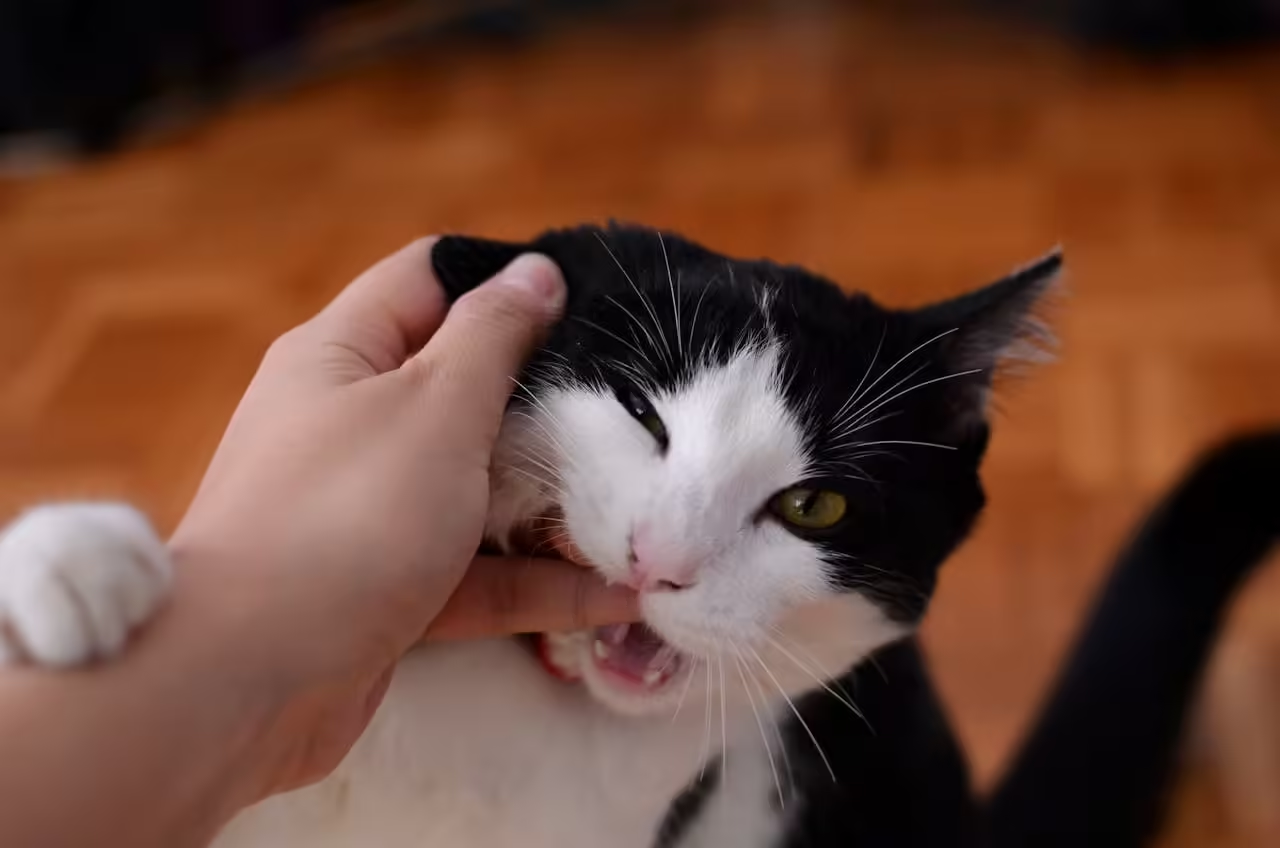Why Does My Cat Bite Me? How to Stop Cat Biting: Expert Advice
For pet owners, cat bites can be a perplexing and even traumatic experience. As a single cat owner who has received numerous bites from my cat, I’m sharing my expertise and experience here to help you understand why your furry friend bites you and how to stop them from doing so.
Understanding Why Cats Bite
Cats bite for a variety of reasons, and understanding these can help you address the behavior effectively.
Play Aggression
Play aggression is one of the most common reasons cats bite. This usually happens when a cat becomes overly excited during play. The biting is not meant to harm but can still be painful.
How to Manage Play Aggression
- Provide Plenty of Toys: Ensure your cat has enough outlets for their energy.
- Set Boundaries: Teach your cat that biting leads to the end of playtime.
- Interactive Play: Engage your cat in activities that mimic hunting, such as using a feather toy or laser pointer.

Stress or Anxiety
Stress or anxiety can also lead to biting. Changes in the environment, new pets, or even loud noises can cause stress in cats, leading them to bite as a defense mechanism.
How to Reduce Stress in Cats
- Create a Safe Space: Provide a quiet, comfortable area where your cat can retreat.
- Maintain a Routine: Cats thrive on routine, so keep feeding, play, and bedtime consistent.
- Use Pheromones: Consider using pheromone sprays or diffusers designed to calm cats.
Fear or Defensive Behavior
A cat may bite out of fear if they feel threatened. This type of biting is often accompanied by other defensive behaviors like hissing or arching the back.
How to Handle Fear-Based Biting
- Avoid Triggering Situations: Identify what causes your cat to feel threatened and try to minimize exposure.
- Desensitization: Gradually introduce your cat to the trigger in a controlled way to help them become less fearful.
- Positive Reinforcement: Reward your cat when they remain calm in situations that previously caused fear.
Overstimulation
Cats can become overstimulated quickly, especially during petting or play. This can result in sudden biting.
Preventing Overstimulation
- Learn Your Cat’s Limits: Pay attention to your cat’s body language and stop petting or playing before they become overstimulated.
- Petting Techniques: Focus on areas your cat enjoys being touched, and avoid sensitive areas like the belly.
- Short Play Sessions: Keep playtime short but frequent to avoid overstimulation.
Is It Normal for Cats to Bite When Playing?
Being hunters by nature, cats frequently imitate hunting techniques in their play. A cat’s natural tendency to bite is common during playtime. Kittens learn how to bite, pounce, and chase each other as they play together. These are all essential behaviors in the wild. As they get bigger, they learn how to control how hard they bite. But sometimes, when cats play with people, they may not realize that their bites can hurt.
Why Do Cats Bite During Play?
- Instinctual Behavior: Cats are predators by nature, and even domesticated cats retain some of these instincts. Playtime allows them to engage in these behaviors in a safe environment.
- Overexcitement: Sometimes, a cat may become overstimulated during play, leading to more aggressive biting.
- Communication: Cats might bite gently during play as a way to communicate that they are engaged and enjoying the activity.
How Will I Know If My Cat Is About to Bite Me?
Recognizing the signs that your cat is about to bite can help prevent injury and improve your relationship with your pet. Cats often give clear signals before they bite, and understanding these cues can help you intervene before it happens.
Common Signs a Cat Is About to Bite
- Tail Flicking: Rapid or strong tail movements can indicate irritation or agitation.
- Dilated Pupils: If your cat’s pupils become large and round, it could be a sign of overstimulation or aggression.
- Ears Back or Flat: When a cat’s ears are pinned back or flattened, they are likely feeling threatened or angry.
- Growling or Hissing: Vocalizations such as growling or hissing are clear indicators that your cat is uncomfortable.
- Rigid Body Posture: A tense or stiff body posture, often combined with a fixed stare, suggests that a cat is ready to attack.
What to Do When You Notice These Signs
- Stay Calm: Reacting calmly can help defuse the situation.
- Give Space: Allow your cat to retreat or have some alone time.
- Redirect Attention: Use a toy or treat to distract your cat and change their focus.
Training Tips to Stop Biting
Training your cat not to bite requires patience and consistency. Here are some strategies to help curb this behavior.
Training Techniques
- Positive Reinforcement: Reward your cat with treats or affection when they play gently or refrain from biting.
- Clicker Training: Use a clicker to mark the behavior you want to encourage, followed by a treat. Over time, your cat will associate the click with positive behavior.
- Consistency Is Key: Ensure all family members are consistent in how they react to biting. Mixed signals can confuse your cat and make training less effective.
- Avoid Rough Play: Do not encourage rough play with hands or feet, as this can lead to biting during playtime.

What To Do When Your Cat Bites?
If your cat bites you, it’s important to react appropriately to avoid reinforcing the behavior and to ensure your safety.
Steps to Take After a Cat Bite
- Do Not Punish: Yelling at or hitting your cat can increase anxiety and aggression. Instead, try to understand the reason behind the bite.
- Avoid Sudden Movements: Quick movements might trigger more bites. Slowly remove your hand or body part from the cat’s reach.
- Assess the Situation: Determine why the bite occurred. Was the cat overstimulated, scared, or trying to communicate something?
- Give Your Cat Space: After a bite, allow your cat some time alone to calm down.
- Seek Medical Attention If Necessary: Cat bites can lead to infections, so clean the wound thoroughly and consult a doctor if needed.
How to Treat Cat Bites?
Cat bites can lead to infections if not treated properly, due to the bacteria present in a cat’s mouth.
Immediate Steps to Take
- Wash the Wound: Use soap and water to clean the bite area thoroughly.
- Apply Antiseptic: After washing, apply an antiseptic solution to the wound.
- Cover the Wound: Use a clean bandage to cover the bite and protect it from further infection.
- Monitor for Signs of Infection: Look out for redness, swelling, or pus around the wound. If these occur, seek medical attention.
When to See a Doctor
- Signs of Infection: If the wound becomes red, swollen, or produces pus, medical attention is necessary.
- Fever or Systemic Symptoms: If you develop a fever or feel unwell after a cat scratch or bite, seek medical advice immediately.
- Pre-existing Conditions: Individuals with compromised immune systems or pre-existing health conditions should consult a doctor as a precaution.
- Tetanus Concerns: If you haven’t had a tetanus booster in the last ten years, you may need to get one, especially for deeper bites or scratches.
Should I Go to the Vet If My Cat Bites So Much?
Frequent biting can be a sign that something is wrong with your cat, either physically or emotionally. Consulting with a vet can help you determine the underlying cause.
Reasons to Consult a Vet
- Behavioral Changes: If your cat’s biting is a sudden behavior change, it could indicate an underlying health issue or emotional problem.
- Excessive Biting: Frequent or severe biting may require professional evaluation to address possible causes like pain or medical conditions.
- Infection Concerns: If your cat’s bites are leading to wounds that are not healing properly or are showing signs of infection, a vet’s advice is crucial.
- Behavioral Advice: Vets can guide managing and modifying your cat’s behavior if it’s rooted in anxiety, stress, or aggression.
Frequently Asked Questions
Conclusion
Understanding why your cat bites and learning how to manage and prevent this behavior is essential for a harmonious relationship with your feline friend. By recognizing the signs of impending bites, addressing the root causes of biting behavior, and implementing effective training strategies, you can reduce the likelihood of painful incidents. Remember to treat bites promptly and seek professional advice if needed, whether it’s from your vet or a doctor. With patience and consistent effort, you can help your cat develop more positive ways to interact with you, ensuring a happy and healthy bond.







